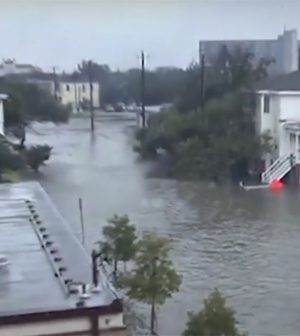- Could Your Grocery Store Meat Be Causing Recurring UTIs?
- Are You Making This Expensive Thermostat Error This Winter?
- Recognizing the Signs of Hypothyroidism
- 10 Strategies to Overcome Insomnia
- Could Artificial Sweeteners Be Aging the Brain Faster?
- Techniques for Soothing Your Nervous System
- Does the Water in Your House Smell Funny? Here’s Why
- Can a Daily Dose of Apple Cider Vinegar Actually Aid Weight Loss?
- 6 Health Beverages That Can Actually Spike Your Blood Sugar
- Treatment Options for Social Anxiety Disorder
After Ian’s Destruction: How to Safely Enter, Clean Flood-Damaged Homes

The devastation left by one of the strongest hurricanes to hit Florida in years is immense. But residents flooded out of their homes by Hurricane Ian must be cautious when they return, federal experts warn.
First off, always assume there’s potential risk from electricity or gas leaks, say experts at the U.S. Centers for Disease Control and Prevention. Return during the daytime, so you don’t need to turn on any lights, and use battery-powered flashlights or lanterns rather than candles, gas lanterns or torches.
If there’s standing water and you can turn off the house’s main power from a dry location, do so first — even if that means you delay starting cleanup.
But if accessing the main power switch means entering standing water, call an electrician to turn it off.
“Never turn power on or off yourself or use an electric tool or appliance while standing in water,” the CDC says.
Sniff the air as you enter. If you smell gas or suspect a leak, then turn off the main gas valve and open all windows before leaving your house as quickly as possible, the CDC advises. Don’t turn on the lights or do anything that could cause a spark.
Notify the gas company or emergency officials about the suspected leak, and don’t go back in until you’re told it’s safe.
Even if there are no power problems, you’ll only want to enter briefly at first to open doors and windows. Airing out the house for at least a half-hour is important, particularly if it’s been closed up for several days.
Mold hazards
Assume that the house has mold if it’s been flooded and closed up for days, the CDC says.
Dry the house out as soon as possible. Use a wet-dry vacuum or water pump to remove standing water, then fans and dehumidifiers to remove excess moisture. Fans should be placed to blow air out of the house, to prevent mold from spreading.
If you don’t have electricity and need to run a generator to power your equipment, make sure you place the generator outside and at least 20 feet away from any door, window or vent to ward off carbon monoxide poisoning. Be sure to wear rubber boots if operating electrical equipment in wet areas.
Get an HVAC cleaning professional to check your system before turning on your air conditioning, or you could spread mold throughout the house. Professional cleaning will kill the mold and prevent later mold growth.
Food and water
Also consider that a flooded house could be contaminated with sewage.
Follow local guidance on whether public water is safe to drink, and get water from a private well tested before you use it. Bottled, boiled or treated water is safe for drinking, cooking and personal hygiene.
Throw away any food that might have come into contact with flood water, as well as perishable foods that have not been refrigerated properly.
“Unsafe food can make you sick even if it looks, smells and tastes normal,” the CDC says. “When it doubt, throw it out.”
Use a generator safely
Don’t attach a generator to your home’s electrical system unless you’ve talked to your power utility. The generator must have approved automatic-interrupt devices, as it can become a major fire hazard if it’s on when electrical service is restored. The improper connection of a generator to your home’s electrical circuits also can endanger line workers helping restore power for everyone.
More information
The U.S. Centers for Disease Control and Prevention has more about cleaning up safely after a disaster.
SOURCE: U.S. Centers for Disease Control and Prevention
Source: HealthDay
Copyright © 2026 HealthDay. All rights reserved.










